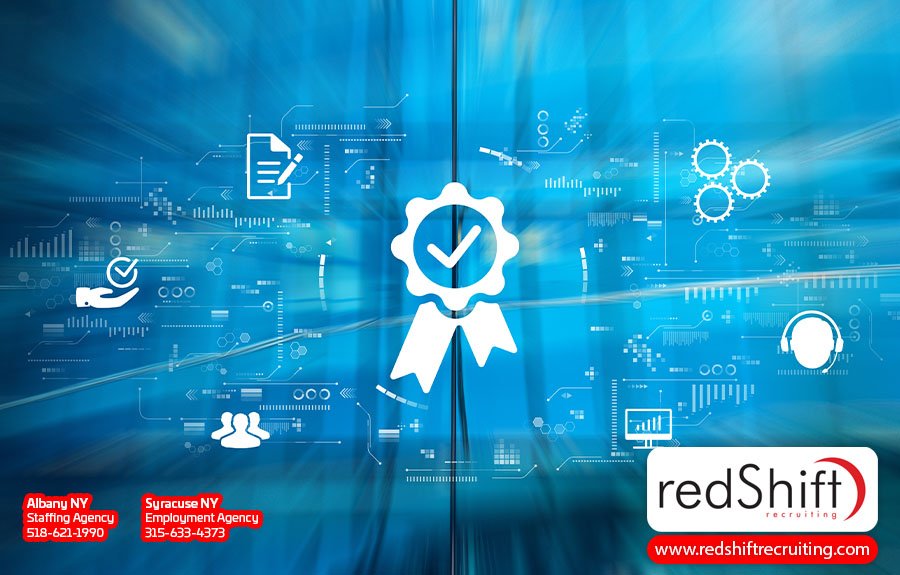
Microsoft Certifications
Microsoft certifications are a powerful tool for professionals looking to enhance their skills and advance their careers. From Azure AI Fundamentals to Microsoft Power Platform, these certifications cover a wide range of domains and offer a host of benefits, including validation of skills, increased earning potential, and access to valuable resources. In this article, we'll list available Microsoft certifications, the benefits of getting certified, and what you need to know to obtain these certifications. Whether you're a seasoned IT professional or just starting your career, earning a Microsoft certification can be a smart investment in your future.
What Is a Microsoft Certification?
A Microsoft certification is an industry-recognized credential that demonstrates a person's skills and knowledge in various Microsoft technologies and products. It validates that an individual has the necessary skills and expertise to perform a specific job related to Microsoft technologies. These certifications are awarded by Microsoft after an individual passes one or more certification exams that test their knowledge and skills in a specific technology or product.
What Are the Different Types of Microsoft Certifications?
Microsoft certifications are divided into different categories based on job roles, technologies, and experience levels. Some of the most popular Microsoft certifications and categories include Microsoft Azure, Microsoft Dynamics 365, Microsoft 365, Microsoft Power BI Data Analyst, Microsoft Cyber Security Architect, and Power Platform Solution Architect. There are many certification paths, so select a certification that aligns with your interests, skills, and career goals. Microsoft offers a variety of certification exams, so make sure you choose the one that aligns with your professional aspirations.
What Certifications Does Microsoft Offer?
Microsoft 365 Certified: Collaboration Communications Systems Engineer Associate
Microsoft 365 Certified: Enterprise Administrator Expert
Microsoft 365 Certified: Messaging Administrator Associate
Microsoft 365 Certified: Modern Desktop Administrator Associate
Microsoft 365 Certified: Security Administrator Associate
Microsoft 365 Certified: Teams Administrator Associate
Microsoft 365 Certified: Teams Application Developer Associate
Microsoft 365 Certified: Teams Voice Engineer Expert
Microsoft 365 Certified: Teamwork Administrator Associate
Microsoft Certified: Azure AI Engineer Associate
Microsoft Certified: Azure Administrator Associate
Microsoft Certified: Azure Data Engineer Associate
Microsoft Certified: Azure Data Scientist Associate
Microsoft Certified: Azure Database Administrator Associate
Microsoft Certified: Azure Developer Associate
Microsoft Certified: Azure Enterprise Data Analyst Associate
Microsoft Certified: Azure Network Engineer Associate
Microsoft Certified: Azure Security Engineer Associate
Microsoft Certified: Azure Solutions Architect Expert
Microsoft Certified: Azure Stack Hub Operator Associate
Microsoft Certified: Cybersecurity Architect Expert
Microsoft Certified: DevOps Engineer Expert
Microsoft Certified: Dynamics 365 + Power Platform Solution Architect Expert
Microsoft Certified: Dynamics 365 Business Central Functional Consultant Associate
Microsoft Certified: Dynamics 365 Commerce Functional Consultant Associate
Microsoft Certified: Dynamics 365 Customer Service Functional Consultant Associate
Microsoft Certified: Dynamics 365 Field Service Functional Consultant Associate
Microsoft Certified: Dynamics 365 Finance Functional Consultant Associate
Microsoft Certified: Dynamics 365 Marketing Functional Consultant Associate
Microsoft Certified: Dynamics 365 Sales Functional Consultant Associate
Microsoft Certified: Dynamics 365 Supply Chain Management Functional Consultant Associate
Microsoft Certified: Dynamics 365 Supply Chain Management Functional Consultant Expert
Microsoft Certified: Dynamics 365 Supply Chain Management, Manufacturing Functional Consultant Associate
Microsoft Certified: Dynamics 365: Finance and Operations Apps Developer Associate
Microsoft Certified: Dynamics 365: Finance and Operations Apps Solution Architect Expert
Microsoft Certified: Identity and Access Administrator Associate
Microsoft Certified: Information Protection Administrator Associate
Microsoft Certified: Power Apps + Dynamics 365 Developer Associate
Microsoft Certified: Power Automate RPA Developer Associate
Microsoft Certified: Power BI Data Analyst Associate
Microsoft Certified: Power Platform App Maker Associate
Microsoft Certified: Power Platform Developer Associate
Microsoft Certified: Power Platform Functional Consultant Associate
Microsoft Certified: Power Platform Solution Architect Expert
Microsoft Certified: Security Operations Analyst Associate
Microsoft Certified: Windows Server Hybrid Administrator Associate
Microsoft Certification FAQs
What Are the Benefits of Getting a Microsoft Certification?
Earning a Microsoft certification is a recognition of your professional achievement, which can help you stand out in a crowded job market and improve your overall reputation in your field. There are many benefits to getting a Microsoft certification, including:
Opportunities for career advancement: Microsoft certifications can open up new opportunities for career advancement, including promotions, job transfers, and new job opportunities that may not have been available otherwise.
Increased earning potential: Earning a Microsoft certification can lead to higher salaries and promotions, as some employers will be willing to offer a pay increase for a Microsoft certified professional.
Greater job security: In an ever-changing job market, having a Microsoft certification can provide a sense of job security, as it demonstrates your commitment to continuous learning and staying up-to-date with the latest technologies.
Validation of skills and knowledge: Objectively verifies the individual has obtained a certain level of proficiency and expertise in using Microsoft technologies through a series of rigorous exams and training programs. This can be an important factor for employers who are looking for skilled and knowledgeable professionals to fill specific roles within their organization.
Recognition of professional achievement: Recognizes the completion of Microsoft certification training as well as your dedication and commitment to your profession.
Access to exclusive Microsoft resources and communities: Microsoft certified professionals have access to exclusive resources, such as training and networking opportunities, that can help them stay up-to-date with the latest trends and technologies.
Increased confidence: By earning a Microsoft certification, professionals can gain more confidence in their abilities and knowledge, which can translate to increased job satisfaction and better performance.
How Do I Choose Which Microsoft Certification Is Right for Me?
Choosing the right Microsoft certification can depend on several factors, such as your current job role, career aspirations, and industry trends. Whether you want to specialize in data management, data engineering and data models, machine learning, cloud platform, or any Microsoft solutions, you will need to identify which certification is right for your career.
Start by identifying your career goals and what skills and knowledge you will need to acquire to reach them. For example, if you want to specialize in cloud computing, you might consider a certification in Microsoft Azure Fundamentals. Next, evaluate your current skills and knowledge to identify any gaps that a certification could fill. Research available certifications to understand different certification paths, skills measured, and exam requirements to determine what is most relevant to your career goals and technical skills. Additionally, research industry trends to identify which certifications are the most highly valued in your industry and can help you stand out from other candidates. Finally, get advice from experts and IT coworkers to get their insight on which certification will be the most valuable for you.
Ultimately, the right Microsoft certification can help you advance your IT career and achieve your professional goals, so take the time to assess your options and identify the best certification for you.
How Do I Earn a Microsoft Certification?
To earn a Microsoft certification, you must pass one or more certification exams. Microsoft offers role-based, fundamentals, and Microsoft Office Specialist (MOS) exams. Role-based exams are designed for specific job roles, while fundamentals exams test basic knowledge and understanding of Microsoft technologies. You can prepare for exams by taking courses, attending workshops and instructor-led training, and using study materials provided by Microsoft.
How Do I Prepare for a Microsoft Certification Exam?
Microsoft provides a variety of resources to help you prepare for certification exams, including official study guides, practice tests, exam prep videos, Microsoft Learn resources, and online training courses from Microsoft certified trainers. You can also find many third-party resources, such as books, online communities, and study groups, to help you prepare.
Make the most of these resources to practice and prepare for your exam. Most exams have 40–60 questions and range from 45 minutes to 2 hours. Applicants can practice working with different question types in the exam environment using the exam sandbox. Question types can include short answer, multiple choice, drag and drop, case studies, build lists, best answer questions, hands-on labs, and more. While studying for your test, make sure to get enough rest and avoid cramming. Take breaks and practice good study habits to help you retain information and reduce stress before the exam.
What Is the Cost of a Microsoft Certification Exam?
The cost of a Microsoft certification exam varies depending on the exam. In general, exams typically range from $99 to $165 USD. There may also be certification bundles and exam discounts for students, educators, and military personnel.
How Long Does a Microsoft Certification Last?
Microsoft certifications expire after one year unless they are renewed, with the exception of the Microsoft Fundamentals Certification, which does not expire. Certifications can be renewed by passing the renewal assessment exam online through Microsoft Learn. While renewals are free, if your certification expires, you must start over by passing the original required exam again.
Can I Earn Microsoft Certifications Online, or Do I Have to Attend a Physical Classroom?
Yes, you can earn Microsoft certifications online. Microsoft offers a variety of online training courses, study guides, and practice exams to help you prepare for certification. You can also take the certification exams online through Microsoft's online proctored exam system, which allows you to take the exam from your home or office, as long as you have a reliable internet connection, your computer passes the system test, and you have a working webcam and microphone.
To take a Microsoft certification exam online, you must first create a Microsoft account and schedule an appointment through the Microsoft Certification website. You will need to provide a valid form of identification and ensure that your computer meets the technical requirements for the exam. During the exam, you will be monitored by a proctor through your webcam and microphone to ensure that you comply with exam policies and procedures. If you choose this option, it is important to ensure that you have a quiet and distraction-free environment to take the exam and that you have prepared adequately to pass the exam.
How Long Does It Take to Earn a Microsoft Certification?
The amount of time it takes to earn a Microsoft certification can vary depending on several factors, such as your prior experience and knowledge, the type of certification you are pursuing, and how much time you are able to dedicate to studying.
Some Microsoft certifications, such as the Microsoft Technology Associate (MTA), can be earned in a matter of weeks with focused study. Other certifications, such as the Microsoft Certified Solutions Expert (MCSE) or the Microsoft Certified Solutions Developer (MCSD certifications), can take several months or even longer to earn, depending on your level of expertise.
Additionally, Microsoft offers a variety of different certification paths, each with its own set of requirements and recommended training courses. It's important to research the specific certification you are interested in and familiarize yourself with its requirements and the training materials available. Overall, the amount of time it takes to earn a Microsoft certification can vary widely and will depend on your individual circumstances and goals.
How Do Microsoft Certifications Help Me in My Career?
From security engineers to solution architects, earning a Microsoft certification can be highly beneficial to advancing your career. Firstly, earning a Microsoft certification validates your skills and knowledge in a specific area, making you a more competent and attractive candidate to potential employers. These certifications demonstrate your commitment to ongoing learning and professional development, which can help you climb the career ladder and earn higher salaries. Additionally, having a Microsoft certification gives you a competitive advantage in the job market, showing that you have a specialized skill set that sets you apart from other candidates. Microsoft certification holders also gain access to a range of resources, such as training materials, support forums, and exclusive events, which can help them stay up-to-date with the latest technology trends and developments.
Conclusion
In conclusion, Microsoft certifications are a valuable tool for advancing your career and staying competitive in today's job market. Whether you're looking to specialize in Microsoft Azure AI Fundamentals, become a Microsoft Certified Educator, or develop expertise in the Microsoft Power Platform, these certifications demonstrate your proficiency in various domains of technology. From core infrastructure to enterprise applications, Microsoft offers a wide range of certifications that can help you validate your skills, increase your earning potential, and gain access to valuable resources. Regardless of your career goals, earning a Microsoft certification can be a smart investment in your future, helping you stay current with the latest technology trends and developments while also standing out to potential employers.
Interested in other certifications? Learn more below:




